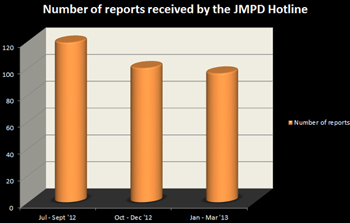
Corruption Watch recently took to the streets of Joburg to find out how the city’s anti-corruption plan is progressing, especially among the ranks of the metro police division. If the statistics are anything to go by, cops do seem to be cleaning up their act.
The city’s strategy was born nine months ago in reaction to Corruption Watch’s hard-hitting report, the Law for Sale, and ensuing No more tjo-tjo campaign, which detailed the extent of bribery on Joburg’s roads and rampant corruption among officers in the Johannesburg Metropolitan Police Department (JMPD).
As part of its strategy, the city established a hotline for the public to report corruption and fraud in the JMPD, and assured there would be action taken against guilty officers.
Check our list of specific bribe spots, according to the individuals who have reported to us, to see if your area is a tjo-tjo trap!
What the numbers say
First up, Corruption Watch checked in with JMPD spokesperson Wayne Minnaar to determine if his unit was managing to keep tabs on tjo-tjo. Watch our video here.
According to Minnaar, since the launch of the City’s anti-corruption campaign, there has been a reduction in the number of corruption and bribery cases reported to the JMPD internal offices, as well as those reported through the media.
“We are confident that the statistics of corruption that have been reported to the internal affairs unit show how the situation is improving at this point in time,” he told Corruption Watch.
He said the reduction in complaints received was a direct result of the City’s anti-corruption plan, adding that it had made officers aware that they were being closely watched and monitored.
The JMPD has handed Corruption Watch the official statistics from its hotline, which do indeed show a drop in the number of complaints received by its internal affairs unit. In the third quarter of 2012, there were 119 complaints received. In the final quarter, 100 complaints were received and in the first quarter of 2013, there were 96 cases reported.
Corruption Watch has also been monitoring complaints about JMPD corruption through our own tip-off channels, and we’re seeing a similar pattern: since late last year, the number of reports implicating the JMPD has declined.
Of the prosecution cases that have been finalised, one officer was given a verbal warning, one was dismissed, two received a suspended sentence, three resigned, one passed away, and three were charged with misconduct by the internal affairs department.
Minnaar noted that in cases where officers resigned legally, they could not be prosecuted internally but they still faced criminal charges. Between July 2012 and March 2013, 18 metro cops were criminally charged for corrupt behaviour.
He explained that a verbal warning was issued, for example, when officers used foul language or submitted false accident reports. Acts of bribery, however, constituted outright dismissal.

